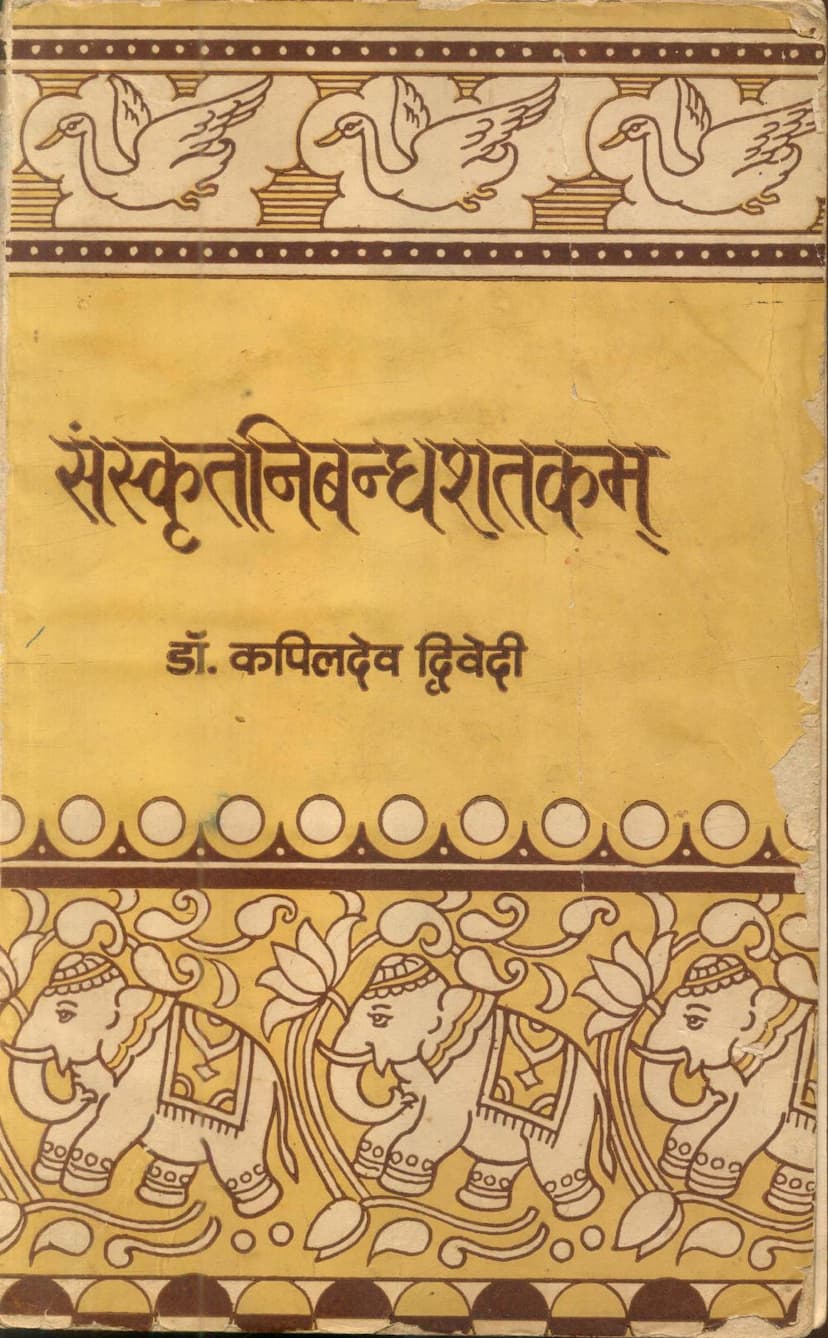Sanskrut Nibandh Shatakam
Added to library: September 2, 2025

Summary
Here is a comprehensive summary of the Jain text "Sanskrit Nibandh Shatakam" by Dr. Kapildev Dwivedi, based on the provided pages:
Book Title: Sanskrit Nibandh Shatakam Author: Dr. Kapildev Dwivedi Publisher: Vishvavidyalay Prakashan, Varanasi
Overview:
"Sanskrit Nibandh Shatakam" by Dr. Kapildev Dwivedi is a monumental collection of 100 essays in Sanskrit, covering a vast array of subjects ranging from Vedic and philosophical topics to literary, linguistic, cultural, social, economic, national, educational, and miscellaneous themes. The book aims to provide mature, university-level scholarly discussions on these subjects, presented in refined, elegant, and accessible Sanskrit.
Author's Vision and Style:
Dr. Kapildev Dwivedi, an esteemed scholar with multiple postgraduate degrees and numerous accolades, conceived this work to fill a perceived need for a comprehensive and critically analyzed collection of Sanskrit essays. He sought to present knowledge in a way that would not only appeal to seasoned Sanskrit enthusiasts but also engage and captlure the interest of the general reader. His writing style is characterized by:
- Scientific Approach: Employing a modern scientific approach, similar to that found in English, German, and French scholarly writing, with well-reasoned arguments, comprehensive factual compilation, and systematic presentation.
- Scholarly Depth: Integrating the views of both Indian and Western scholars where relevant.
- Refined Language: Utilizing refined, graceful, and profound Sanskrit, avoiding unnecessary verbosity and pedantry.
- Holistic Coverage: Addressing not just traditional Vedic and philosophical subjects but also modern, contemporary topics like Five-Year Plans, Cottage Industries, Cooperative Movements, Democracy, Socialism, Communism, and international relations.
Content and Structure:
The book is meticulously organized into eleven sections, each dedicated to a specific category of essays:
- Vedic and Scholarly Essays (10 essays): Covering the importance of Vedas, Vedangas (Six limbs of Vedas), Grammar, Upanishads, Bhagavad Gita, Ramayana, Mahabharata, Puranas, and examination of knowledge in Bhagavata Purana.
- Philosophical Essays (6 essays): Discussing the significance of Indian philosophies, the concept of Karma, Sankhya and Yoga philosophies, and the statement "Brahman is real, the world is an illusion."
- Literary Criticism Essays (11 essays): Delving into the definitions of poetry (Vakyam Rasatmakam Kavyam), the role of Vakrokti (indirect speech), Riti (style), Dhvani (suggested meaning), Rasa theory, and various poetic styles like Vaidarbhi and Panchali. It also covers the significance of Alankaras (figures of speech).
- Literary Essays (15 essays): Focusing on prominent literary works and authors, including the significance of "Abhijnanashakuntalam," comparisons of poets like Kalidasa, Bharavi, Dandin, Magha, and Bhavabhuti, and the importance of drama and prose in Sanskrit literature.
- Linguistic Essays (5 essays): Exploring the contribution of Indians to linguistics, theories of language origin, semantics, and comparisons between Vedic and classical Sanskrit, and Sanskrit and Prakrit languages.
- Cultural Essays (9 essays): Highlighting Vedic and Indian culture, the role of Sanskrit in Indian culture, the position of women in Indian culture, the importance of truth, non-violence (Ahimsa), and the concept of Dharma.
- Social Essays (5 essays): Addressing the necessity of women's education, the advantages and disadvantages of science, the caste system and the ills of the caste system, and brief discussions on Maharshi Dayananda and Mahatma Gandhi.
- Economic Essays (3 essays): Covering Cottage Industry, Cooperative Movement, and Family Planning.
- National Essays (8 essays): Discussing Five-Year Plans, Democracy, Socialism, Communism, means for world peace, youth's entry into politics, the concept of "Vasudhaiva Kutumbakam" (the world is one family), and patriotism.
- Educational Essays (8 essays): Emphasizing the importance of Sanskrit language, measures for its preservation and propagation, reforms needed in the Indian education system, educational psychology, the place of Sanskrit in modern India, the Three-Language Formula, the problem of indiscipline, and the reverence for teachers.
- Miscellaneous Essays (20 essays): A diverse collection covering various philosophical and ethical topics, including the balance between destiny and human effort, the power of hope, the importance of motherland, the strength in unity, the cyclical nature of life, adapting strategy to circumstances, the value of health, the role of effort, self-upliftment, the essence of action (Yogaḥ Karmasu Kauśalam), the importance of merit over status or age, prudence in action, the remedy for worry, the supreme value of knowledge, the benefits of good company, the influence of wealth, the importance of perseverance, and the criterion for judging ancient texts.
Key Features highlighted in the "Prastavik" (Introduction):
- Addressing a Need: The author identified a gap in existing Sanskrit essay collections, many of which were either too brief, too voluminous, lacking refinement, or overly focused on pedantic display.
- Balanced Approach: The book aims for a balance between scholarly depth and accessible language, ensuring that the vast knowledge presented is both informative and engaging.
- Modern Relevance: A significant aspect is the inclusion of modern topics, demonstrating the enduring relevance and adaptability of Sanskrit for discussing contemporary issues.
- Scientific Methodology: The essays adhere to a rigorous, evidence-based approach, citing sources and integrating diverse perspectives.
- Linguistic Purity and Adaptability: While maintaining a high standard of Sanskrit, the author also incorporates modern terminology where necessary for clarity, especially for scientific and economic concepts, sometimes using Sanskritized forms of English words.
- Dedication: The work is dedicated to the author's wife, Shrimati Om Shanti Dwivedi, acknowledging her as a source of inspiration.
In essence, "Sanskrit Nibandh Shatakam" is a comprehensive and authoritative compilation that showcases the richness of Sanskrit literature and its capacity to address both timeless philosophical truths and pressing modern challenges. It stands as a testament to Dr. Kapildev Dwivedi's scholarship and his dedication to promoting Sanskrit studies.